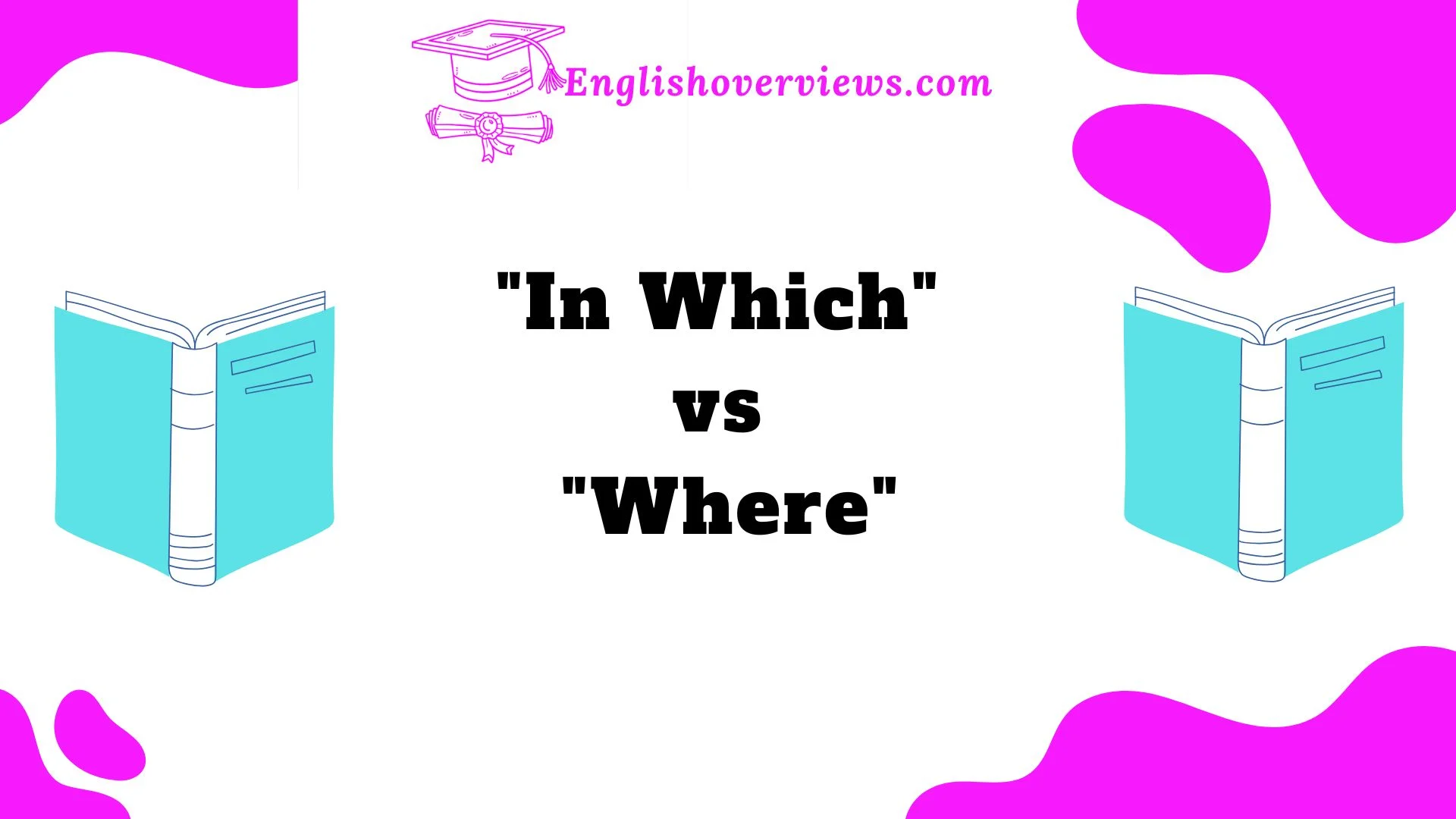When it comes to writing, clarity and precision are key. However, some commonly used words can often cause confusion. One such pair of words are “in which” vs “where”.
While these two may seem interchangeable at first glance, their proper usage can significantly affect the tone, formality, and clarity of your writing.
Understanding when and why to use one over the other can elevate your writing, whether you’re crafting legal documents, composing a research paper, or just refining your everyday communication.
In this blog post, we will delve into the nuances of “in which” and “where,” exploring their definitions, contexts, and correct uses. By the end, you’ll be equipped with a deeper understanding of these terms, helping you to choose the most effective one for every situation.
Whether you’re a student, professional writer, or simply a language enthusiast, mastering these terms will make your writing more precise and engaging.
Understanding ‘Where’ and ‘In Which’
The first step to mastering the use of “where” and “in which” is to understand what each of these terms means. Both words are used to describe locations or conditions, but they differ in tone, formality, and specificity.
- “Where” is a relative adverb often used to specify a place or situation. It’s direct, simple, and used in both casual and formal writing.
- Example: The cafe where we met was cozy.
- “In which” is a relative pronoun used in more formal or academic contexts to clarify or specify a situation or location. It’s more precise and often seen in legal documents, academic papers, or literary works.
- Example: The policy in which the changes were made is under review.
Though these two can sometimes convey similar meanings, their tone and context set them apart. Let’s break down their functions in more detail.
The Role of ‘Where’ in Sentences
“Where” is incredibly versatile and easy to use in everyday conversation. It functions to indicate location or condition without requiring extra detail. It’s often used in casual, informal contexts to keep sentences clear and straightforward.
When to Use ‘Where’:
- Describing physical locations:
- The office where I work is on the fifth floor.
- In everyday speech and writing:
- This is the town where I grew up.
- To describe a condition or state:
- I remember the time where everything felt perfect.
The simplicity of “where” makes it ideal for most informal writing and conversational tones. Its usage is widespread in fiction, blogs, casual articles, and even spoken language.
Breaking Down ‘In Which’: Usage in Formal Writing
On the other hand, “in which” is a more formal structure. It’s used when you need to clarify a specific condition, situation, or location that requires more detail. The phrase typically fits best in legal documents, academic papers, technical writing, or historical texts.
When to Use ‘In Which’:
- Formal situations:
- The report in which the findings were detailed is now available for review.
- Legal or technical documents:
- The contract in which these terms are stated is legally binding.
- Historical and literary texts:
- The period in which these events took place is crucial to understanding the context.
“In which” lends a level of sophistication and specificity to the sentence, making it highly suitable for professional or academic settings. It’s often used in passive voice constructions to make the sentence sound more objective and formal.
Understanding ‘Wherein’ and Its Specific Context
Now, let’s discuss a term that is closely related to “in which”: “wherein”. This word is much rarer and primarily used in legal, historical, and archaic writing. While “wherein” has the same meaning as “in which,” it is often seen as more complex and stiff in modern writing.
When to Use ‘Wherein’:
- Legal contexts:
- The document wherein the terms are outlined must be signed before proceeding.
- Historical or literary uses:
- The period wherein the great events occurred was marked by uncertainty.
Because “wherein” is so formal, it’s rarely used in modern everyday speech or writing. Instead, “in which” tends to be the preferred choice in formal documents or situations.
When to Choose ‘Where’ Over ‘In Which’
It’s important to know when to use “where” over “in which.” In most cases, “where” is the natural choice due to its simplicity, clarity, and widespread use. Here are some scenarios when “where” is the preferred choice:
Use ‘Where’ When:
- You’re writing in an informal tone:
- The place where we met was magical.
- You’re describing a physical location:
- This is the room where I study.
- Simplicity is key, and extra formality isn’t required:
- The park where we walked was beautiful.
In contrast, “in which” should be reserved for situations where formality, precision, or clarification is needed.
‘In Which’ in Legal, Academic, and Literary Contexts
“In which” is often the go-to phrase for legal, academic, and literary writing due to its ability to add specificity and clarity. Whether you’re drafting a contract, citing a case study, or referencing a literary work, using “in which” conveys a sense of formality that “where” cannot.
Case Study: Legal Writing
Consider this example from a legal context:
The clause in which the responsibilities are outlined is non-negotiable.
Here, “in which” clarifies exactly where the responsibilities are stated, adding weight and precision to the document.
Example in Academic Writing:
The study in which the experiment was conducted revealed significant results.
In academic writing, “in which” is used to explain where or how something happened in a clear, structured manner.
The Subtlety of Context in Choosing Between ‘Where’ and ‘In Which’
The choice between “where” and “in which” can sometimes depend on context and the tone of the writing. For instance, if you want to convey a formal, legal, or technical tone, “in which” might be more appropriate. On the other hand, if you’re striving for clarity, brevity, or informality, “where” is the better choice.
Example:
- The library where I found the book was huge. (Informal, everyday)
- The library in which I found the book had an extensive collection of rare books. (Formal, academic or professional)
Common Pitfalls and Misuses to Avoid
When writing, it’s easy to get confused and misuse “where” and “in which.” Here are a few common pitfalls to avoid:
Mistakes to Watch Out For:
- Overusing ‘in which’ in informal writing: It can sound overly formal and awkward in casual contexts.
- Incorrect: I remember the time in which we went on vacation.
- Correct: I remember the time when we went on vacation.
- Using ‘where’ incorrectly in formal contexts: While “where” works in many situations, it’s often too casual for legal or academic writing.
- Incorrect: The case where the defendant was found guilty is still under appeal.
- Correct: The case in which the defendant was found guilty is still under appeal.
Practical Tips for Mastery
Mastering the use of “where” and “in which” requires practice, but a few quick tips can help you navigate their usage more easily:
- Use ‘where’ for simplicity: If the sentence is informal or straightforward, ‘where’ is probably your best bet.
- Use ‘in which’ for formality: In formal, academic, or technical writing, use ‘in which’ to add precision.
- Avoid overcomplicating sentences: If you can convey your message clearly with ‘where’, don’t force ‘in which’ into the sentence.
How Modern Usage Shapes ‘Where’ and ‘In Which’
While “where” remains the preferred choice in modern everyday language, “in which” still holds strong in more formal writing. However, modern usage trends show a shift toward more concise, direct communication. In professional and academic circles, it’s still essential to use these terms correctly, but in general writing, simplicity often wins.
Conclusion: Mastering ‘Where’ vs. ‘In Which’
Understanding the difference between “where” and “in which” is key to becoming a more effective and precise writer. By considering the context, formality, and clarity of your sentences, you can confidently choose the right term for every situation.
Practice makes perfect, so the more you read and write, the better you’ll get at identifying when to use “where” and when “in which” is the superior choice.
FAQs about ‘Where’ and ‘In Which’
- What is the difference between ‘where’ and ‘in which’?
- “Where” is more casual and used in informal contexts, while “in which” is more formal and used to clarify specific situations in professional or academic writing.
- Can I use ‘where’ instead of ‘in which’ in legal writing?
- It’s best to use “in which” in legal writing, as it adds formality and precision.
- Is ‘wherein’ the same as ‘in which’?
- Yes, “wherein” has the same meaning as “in which”, but it is much rarer and used only in very formal, legal, or historical contexts.
- When should I use ‘in which’ instead of ‘where’?
- Use “in which” when you need to be precise, formal, or clarify a specific condition or situation, especially in legal, academic, or technical writing.
- Are there any exceptions to using ‘where’ or ‘in which’?
- The main exception is when you are writing in a very formal tone or discussing specific situations where precision is needed.

Alyan Ashraf is the creative mind behind English Overviews, a platform dedicated to helping learners master the English language. Passionate about education and language development, Alyan specializes in simplifying complex English concepts, making learning accessible for students of all levels.











